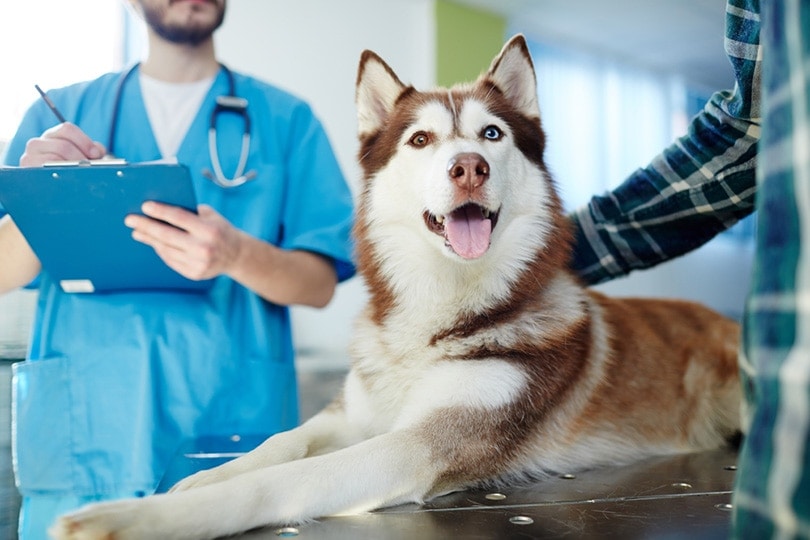How Much Does a Dog DNA Test Cost? Factors, Types & Info

By Misty Layne
Updated on

You’ve likely seen ads for at-home DNA tests that promise to tell you everything from need-to-know health information to your family history. Well, now you can use DNA tests for dogs to find out similar info about your pet. That’s right! With only a few easy steps, you can find out all sorts of things about your dog that you might not have known before.
What is the cost of a dog DNA test, though? Dog DNA tests can run the gamut from relatively inexpensive to super-pricey. Pricing depends on a range of factors, including the kind of information you want to find out about your pet, where you order the test from, and the lab reading the results. Luckily, you can definitely find an affordable test if you want to learn more about your dog’s DNA.
How Much Does a Dog DNA Test Cost?
How much a dog DNA test will cost mainly depends on just how much you want to delve into your pup’s genetics. Some tests will only tell you about the exact breed (or breeds) your dog is, while others can tell you about potential health risks and more. You’ll also find that dog DNA tests are one of those items where you get what you pay for; cheap tests often have poor customer reviews and may not be as accurate as more expensive tests.
That said, dog DNA tests typically are in the range of a couple of hundred dollars or less.
How Does Dog DNA Testing Work?
It may seem strange to consider testing your pet’s DNA, but the opportunity to learn more about them can make one curious. Dog’s DNA contains distinctive genetic markers, much like human DNA, which is why dog and human DNA testing is done similarly. While each DNA test kit may vary to some degree, in most cases, you’ll just need to:
- Order a test kit from Chewy, Amazon, the AKC, or a dog DNA test company’s own website.
- Obtain a sample of your pup’s DNA by using the swab provided in the kit to swipe the inside of their cheek.
- Follow the test kit instructions on how to package and send your dog’s sample to the lab. After the lab receives the sample, they’ll compare it against their breed database (each test kit company has its own).
- Then, sit back and wait for your results to arrive either via mail, email, or an online portal!
You’ll likely wait a few weeks or even months to get your results back, but when you do, you’ll learn much more about your doggo!
What Can You Learn from Dog DNA Tests?

Dog DNA tests can offer a wealth of information about your pup, from breed information to potential future health risks.
Breed Information
If you have a mixed-breed dog, you might wonder just what breeds make up your pup. Doing a DNA test can tell you precisely that! By looking at your dog’s DNA, then analyzing it against a database that contains DNA types for hundreds of dog breeds, a dog DNA test can tell you what percentage of a breed your pet is (for example, 10% Labrador, 25% Cocker Spaniel, etc.).
Plus, you can find whether your furry pal is purebred or not with a dog DNA test. Not all tests will offer this, but some can tell you for sure whether your dog is from a purebred line.
Health Risks
One of the more popular reasons people decide to test their dog’s DNA is to determine whether they have genetic predispositions for certain diseases. Having this knowledge can enable you to help give your pup a long, healthy life by potentially catching illnesses early or even preventing them. Remember, though, that just because your dog has the markers for a certain disease in their DNA, it doesn’t mean they will become sick. It simply means it’s a disease they are more prone to getting.
Some of the diseases you can look for within your dog’s DNA are von Willebrand’s, glaucoma, degenerative myelopathy, and muscular dystrophy. You may also be able to find out if your dog has the multidrug resistance gene (MDRI gene) that can cause negative reactions to certain medications.
Physical Traits
It’s not just information about what breeds make up your dog that you can learn from dog DNA tests. Some tests will also tell you more about your pet’s physical traits. For example, physical trait information can tell you more about what your pup will look like when they are fully grown. This information can inform you about the length and color of your dog’s coat, how much they will shed, how big they’ll be as an adult, and more!
Family Tree
One cool aspect of dog DNA testing is that with the right test, you may be able to find your pet’s family members (at least if those dogs have also taken the same test and are in the company’s database)! Not all tests will offer this, but if you pick one that does, your pup might be able to have a joyful family reunion.
What You Should Know About Dog DNA Tests
Before testing your dog’s DNA, there are a couple of things you should remember about dog DNA tests.
- Tests may not be 100% accurate. How accurate the results of a dog DNA test are will depend in large part on how extensive their breed database is.
- What you learn from a dog DNA test about your pet’s breed shouldn’t change how you think of your pet. For example, if you learn your four-legged friend has a bit of a stigmatized breed like a Pitbull in them, you shouldn’t become alarmed. It doesn’t change the fact your dog is a cuddle monster who loves to steal socks.
- Just because you find out your dog is predisposed to a specific hereditary disease doesn’t mean that they will get it. So, don’t panic. And certainly, listen to your vet about any health-related concerns for your pet, rather than a DNA test!
- Dog DNA tests haven’t been around for that long, so there’s still a lot of research that needs to be done to improve results. While you can learn much from a dog DNA test, they aren’t the end all be all.
Look For These Things in A Dog DNA Test
When searching for the dog DNA test that will fit your pup best, you should consider the following.
What’s Being Looked At
Determine what exactly you’re looking for from a dog DNA test. Do you simply want to know the breed or breeds of your Heinz57? Or are you looking for something deeper, like any health risks that could occur in the future? You’ll need to find a test that looks for everything you want to know.
Results Speed
Some labs will return test results faster than others. If you’re the impatient type, you’ll want to look for a dog DNA test that will get you your results in a matter of weeks rather than months.
Accuracy
Because every testing kit is different, you’ll find that some tests are less accurate than others. You’ll want the most accurate results available (especially if you’re looking at DNA for health concerns), so finding a test that offers that accuracy will provide you with the best information.
Reviews
Don’t simply believe what a company tells you about its dog DNA tests. Read through reviews from people who have used the tests themselves to see what their experiences were in accuracy and speed of getting results.
Conclusion
Dog DNA tests can undoubtedly give you more insight into your beloved pup, but the results shouldn’t be upheld as strict facts. While many tests will be highly accurate when it comes to breed information, others may be less accurate. While finding out more about your pet’s potential health risks can help you keep them healthier in the long run, it’s vital to remember that genetic predisposition doesn’t mean your pet will get a specific disease. These tests can be great to satisfy your curiosity about your dog and create a family reunion or two!
Featured Image Credit: Anna Hoychuk, Shutterstock













